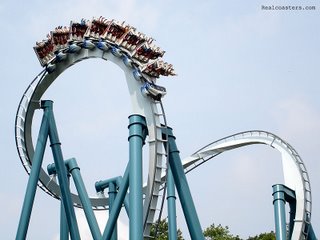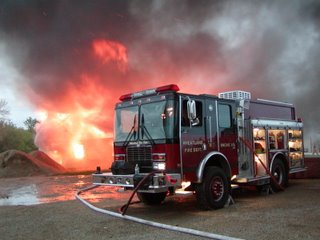 Here's a picture of one of Worland's many thrilling attractions, the "Screaming Dragon" Roller Coaster at Six Flags Over Worland . . .
Here's a picture of one of Worland's many thrilling attractions, the "Screaming Dragon" Roller Coaster at Six Flags Over Worland . . .Just kidding. You may be surprised, but there's nothing quite so spectacular as a roller coaster in these parts. There is, however, a kiddie park with a twisty slide.
But major theme parks aside, we have ridden a roller coaster of another sort in our first six weeks here, both enjoying and struggling with the realities of small town living. This weekend provided a stark contrast in our feelings for Worland.
Friday was supposed to be my day off. Since I had to drop Joy off at school anyway, I thought I'd stop by the hospital to finish a few things up. Four frustrating hours later, I stumbled home for a late lunch, my head reeling from a number of difficult, stressful, and wholly unexpected encounters: drug-seeking patients, complicated referrals, very abnormal lab results, scheduling issues, difficult families, delinquent charts, etc. It was the curse of the small town doctor visiting me for the first time: the inescapability from
 patients and problems.
patients and problems. Luckily, I had something to look forward to that night: Elizabeth's and my first Worland date.
But, boy, was that a bomb (or a fire), as driving down the main drag, we saw the venerable, ancient Worland Community Center engulfed in smoke and flames. We spectated there with the other half of Worland for a bit, then headed to a very lousy (but free) meal at a local Mexican restaurant. With the meal stomached and the Community Center burning to the ground, we then looked for something fun to do.
But nothing came to mind. We could have gone bowling, or . . . what else? We couldn't think of anything else, so we drove in the country around town for a hour, burning gas and talking, which was fun. But looking out from the edges of town across the barren desert stretching endlessly in every direction provoked a feeling of intense isolation for the first time since we've been here. We came home feeling bored, lonely, and stuck. We comiserated for the rest of the night, as both of us vented some negative feelings about the town that we've been politely withholding from each other.
But Saturday morning, something great happened. We met two new friends who have kids with similar ages to ours at a local park. The kids played wonderfully together while Elizabeth and I played tennis with the other couple . . . and we had a wonderful time. The weather was perfect the courts were fantastic (a very cool astro-turf court with light layer of sand over it that plays like clay), and we were very evenly matched with a fun and friendly couple. Then, we got to go home, and I enjoyed a Saturday full of great football games.
Overall, I love living here. And other than a few hours on Friday night, I haven't felt deprived of any big city conveniences. There are downsides to living anywhere, but a few good friends, some nice amenities (minus a community center), nearby mountains, and a strong church make this a most desirable place.
Now if we could just get a decent restaurant . . .
